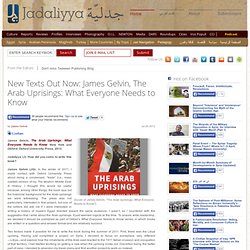

Hamid Dabashi, The Arab Spring: The End of Postcolonialism. Hamid Dabashi, The Arab Spring: The End of Postcolonialism.

London and New York: Zed Books, 2012. Jadaliyya (J): What made you write this book? Hamid Dabashi (HD): As you well know, a massive set of revolutionary uprisings are sweeping across North Africa and Western Asia, from Morocco to Syria and from Bahrain to Yemen. This is all happening in the aftermath of an equally important uprising code-named the Green Movement in Iran. While the Arab uprisings were under way, the Eurozone crisis and civil unrest swept across Europe from Greece to Spain, and before that was completely registered the Occupy Wall Street movement started in the US.
J: What particular topics, issues, and literatures does it address? HD: At least since the Iranian revolution of 1977-1979, I have been thinking and writing about revolutions. How does this work connect to and/or depart from your previous research and writing? J: Who do you hope will read this book, and what sort of impact would you like it to have? James Gelvin, The Arab Uprisings: What Everyone Needs to Know. James Gelvin, The Arab Uprisings: What Everyone Needs to Know.

New York and Oxford: Oxford University Press, 2012. Jadaliyya (J): How did you come to write this book? James Gelvin (JG): In the winter of 2011, I made contact with Oxford University Press about doing a condensed, “trade” (i.e., mass market) version of my The Modern Middle East: A History. I thought this would be useful because, among other things, the book lays out the historical background for the Arab uprisings we were witnessing. The press was not particularly interested in that project, but one of the editors did ask me if I were interested in writing a history of modern Egypt directed toward the same audience. Two factors made it possible for me to write the book during the summer of 2011. A second factor—my location—helped me complete the manuscript in two months.
J: What do you mean by “hone a narrative?” In the book, I identify four factors that rendered Arab regimes vulnerable. [James Gelvin. On the State of Egypt: What Caused the Revolution - Ala' Aswani. The Rise and Fall of Arab Presidents for Life - Roger Owen. The monarchical presidential regimes that prevailed in the Arab world for so long looked as though they would last indefinitely—until events in Tunisia and Egypt made clear their time was up. The Rise and Fall of Arab Presidents for Life exposes for the first time the origins and dynamics of a governmental system that largely defined the Arab Middle East in the twentieth century. Presidents who rule for life have been a feature of the Arab world since independence.
In the 1980s their regimes increasingly resembled monarchies as presidents took up residence in palaces and made every effort to ensure their sons would succeed them. Roger Owen explores the main features of the prototypical Arab monarchical regime: its household; its inner circle of corrupt cronies; and its attempts to create a popular legitimacy based on economic success, a manipulated constitution, managed elections, and information suppression. Zed Books: The Arab Spring by Hamid Dabashi - video. The Arab Spring. This pioneering explanation of the Arab Spring will define a new era of thinking about the Middle East.

In this landmark book, Hamid Dabashi argues that the revolutionary uprisings that have engulfed multiple countries and political climes from Morocco to Iran and from Syria to Yemen, were driven by a 'Delayed Defiance' - a point of rebellion against domestic tyranny and globalized disempowerment alike - that signifies no less than the end of Postcolonialism. Sketching a new geography of liberation, Dabashi shows how the Arab Spring has altered the geopolitics of the region so radically that we must begin re-imagining the 'the Middle East'. Ultimately, the 'permanent revolutionary mood' Dabashi brilliantly explains has the potential to liberate not only those societies already ignited, but many others through a universal geopolitics of hope.
Reviews ‘A refreshing, thoughtful and historical reading of the dramatic changes sweeping the Arab world.’ Sparks and Prairie Fires: A Theory of Unanticipated Political Revolution.